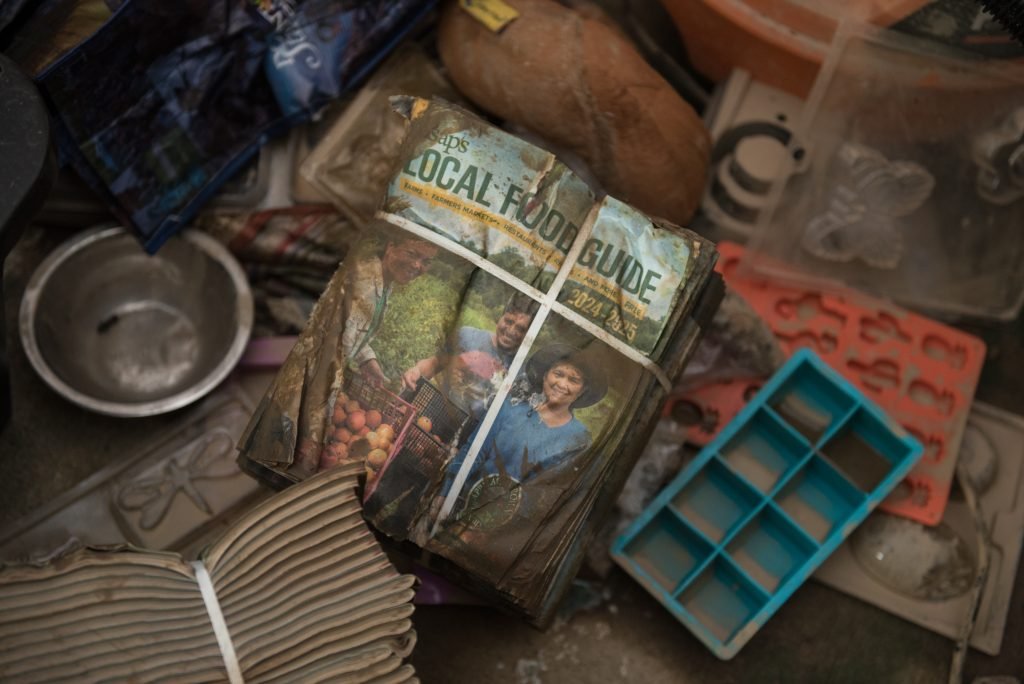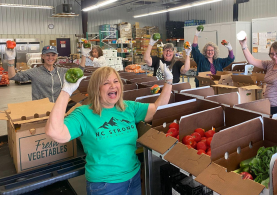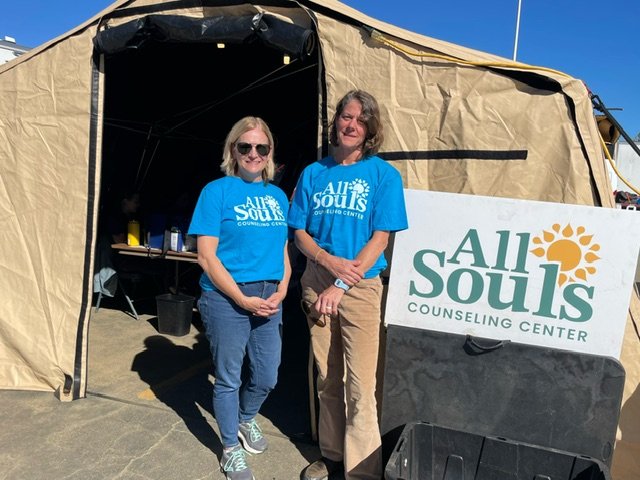Hurricane Helene: The Role of Local Nonprofits During Disasters
By Julia van den Bergh, BBF Director of Strategic Initiatives
In the winter newsletter, I described BBF’s network of partners on the ground, focusing on Foodbanks and Free & Charitable Clinics. As a short recap, BBF’s disaster response begins with analytics, but is shaped, refined, and implemented through human connection. We started by mapping organizations in the anticipated path of disasters and created databases of potential partners on-the-ground such as foodbanks, nonprofit healthcare providers, and local community associations. As the disasters evolved, we connected with partners across the southeast, who painted a full picture of how and where our support was most needed. This is why we invest so much time in researching partners and coordinating with them – their insight is invaluable.
Today, I’m excited to share stories from our partner local community associations and nonprofits. Hurricane Helene landed in late September 2024, but relief efforts are still in full swing and will be for the foreseeable future. All disaster responses go through stages, starting with acute needs such as food, water, shelter, emergency medical care, and communication. After this, more stable living situations, legal advice, accessible healthcare, and fresh food become a priority. Long-term activities include community planning, mental health, affordable housing, and infrastructure repair.
Amy Cantrell, one of our local partners and Co-Director of Beloved Asheville, described their response to each of these stages. Beloved Asheville is now building a community of affordable housing called “Beloved Villages” for those who lost their homes during Helene.
“BeLoved Asheville is dedicating all our resources to help everyone in our mountain home. In the aftermath of Hurricane Helene, we have been on the ground providing essential aid to those affected in Western North Carolina focusing on the most impacted and the most vulnerable.
We are now serving 15,000 people daily in impacted zones. We have also worked in medium-term recovery providing temporary water infrastructure to get schools and childcare centers open and to provide temporary shelters for winter including RVs, yurt-style tents with heat and bathrooms, and tiny homes… We are working for long-term recovery through policy advocacy, home repair to homes with major damage that were not insured, and to re-home Hurricane survivors that lost everything.” Amy Cantrell, Co-Director, Beloved Asheville
Two of BBF’s partners near Asheville focus on supporting farmers and connecting people with fresh, healthy food. Canned and prepared food is of vital importance during the acute phase of a disaster, but communities voice requests for fresh, pre-washed ingredients as the months wear on.
The Appalachian Sustainable Agriculture Project (ASAP)’s mission is to help their network of 850 Appalachian farms thrive, link farmers to markets and supporters, and build healthy communities through connections to local food. In the acute stage, ASAP provided Immediate Needs Grants for farmers. Within three weeks of the storm, they connected directly with over 100 farms and 25 farmers markets. Community members enrolled in Medicaid and Supplemental Nutrition Assistance Program (SNAP) benefits gained access to local fruit and vegetables across 23 counties through ASAP’s Farm Fresh for Health incentive programs. When children returned to school, ASAP’s Growing Minds Farm-to-School program matched educational sites with farms for local purchasing of meals and snacks. ASAP is currently planning the Business of Farming Conference in February, during which local farmers plan for long-term recovery.

Storm-damaged copies of ASAP’s Local Food
Guide. Photo Credit: ASAP
“A grant from BBF will help ASAP to sustain responsive programming critical for supporting farms and communities impacted by Helene through next phases of recovery… One farmer shared that within the chaos of the storm’s aftermath, ‘ASAP offered clear steps of where to start and knowledgeable and supportive staff that helped address my specific needs’. BBF funding will help support both individualized assistance to farmers and dual benefit programs that support small family farms as well as households experiencing food and nutrition insecurity. Support from BBF will fill an important gap in covering the time and care required to continue these core dual benefit programs. This will be key in helping impacted farms and communities move towards stabilization for short- and long-term recovery.” – Nora Scheff, Development Director, ASAP

Bounty & Soul, located slightly east of Asheville in Black Mountain, NC, is another community-driven organization working at the intersection of food, farms, and health. In the three-week aftermath of Hurricane Helene, Bounty & Soul partnered with the World Central Kitchen to provide 2,000 hot meals daily, delivered via pickup trucks or on foot to 19 of the hardest hit neighborhoods, along with requested supplies and equipment. They also provided fresh ingredients to both local restaurateurs and volunteer chefs making meals for impacted individuals. The MANA food bank, which served 18 counties in their region, was completely washed away, so Bounty & Soul took responsibility for the perishable food while MANA rebuilt.
Within a month, Bounty & Soul re-opened large-scale markets and Farmers Market Truck, providing fresh produce to over 5,375 people weekly, while their Benevolent Box program continued to deliver food boxes to households with medical and transportation challenges.
“We are focusing on purchasing food from local and regional farmers to support the sustainability of our local food system…. Our overarching strategy is to build increasing efficiencies into our food sourcing, purchasing and distribution systems so as to be able to meet the growing need for fresh food for Helene affected communities while we also support the local food economy. These efficiencies will allow us to serve more communities that we have already identified as in high need, investing in restoring stability for these households with food, and necessary home goods.” – Ali Casparian, Executive Director, Bounty & Soul
Our partner network brought a new need to my attention: legal support. I think it’s safe to say that many of us struggle to fully understand insurance and government programs during the best of times. Adding the loss of a home, income, power, and cellphone/internet service can make navigating insurance and Federal Emergency Management Agency (FEMA) grants exponentially more difficult.
Legal Aid North Carolina, a nonprofit that provides free legal help, employs a team of attorneys just for this purpose. Legal Aid created a dedicated Helene line to the statewide helpline, staffing it with 10 temporary workers to cut down on wait times. The attorneys inform individuals of their rights, apply for or appeal recovery fund assistance, intervene against fraudulent contractors and unethical landlords, assist with the recovery of necessary legal documents, and address many other disaster-related needs. BBF’s grant helped Legal Aid NC operate the Helene hotline until additional federal funding arrives late 2025.
“In the aftermath of Helene, we mobilized our project team and Western NC offices with several strategies to provide urgent assistance in Western NC. We know these urgent strategies will connect with and prevent fraud and additional harm to affected families. However, our response is there for the long-term. Our staff across the state are supporting Western NC offices in staffing Red Cross shelters, FEMA centers, public library clinics, and other community-based efforts to connect with affected families on a variety of disaster issues. We manage the LANCMobile (a mobile disaster response unit) to reach rural places, with Starlink wifi access on board. Recognizing the need for comprehensive support, the Disaster Relief Project serves as a ‘one-stop-shop’ for locating available resources and has hired additional disaster attorneys and pro bono coordinators to help clients with medical, food, housing, and other basic needs.” – Missy Hatley, Chief Development Officer, Legal Aid NC
A key component of disaster relief is mental health. To address this, BBF partnered with All Souls Counseling and the Buncombe County School Foundation.

Photo Credit: All Souls Counseling Center
All Souls Counseling Center’s (ASCC) mission is to provide quality mental health counseling, outreach, and education, with a focus on those who are uninsured and underinsured in Western NC. In the aftermath of Helene, ASCC opened “Comfort Care Sites” in collaboration with FEMA, ran free online Mental Health Mondays in partnership with the Asheville Chamber of Commerce, and facilitated meetings for a range of community partners to help people process the impact of the hurricane. Long-term, ASCC will focus on a campaign in collaboration with media outlets to raise awareness of mental health and the suicide prevention hotline.
“In line with our core mission and in the wake of Hurricane Helene, we have expanded our service availability and placed therapists at “comfort care sites” close to recovery resource locations to offer mental health check-ins and support. This makes it possible for ASCC to meet some of the critical needs of our fragile, yet resilient community, and to reduce logistical barriers for individuals accessing help. We are flexible and these sites can change as the community needs evolve. Through this new mental health crisis work, our goal is to help individuals tackle the small actions they can now as they begin the long recovery period toward improving their well-being and finding hope.” – Meredith Switzer, Executive Director, All Souls Counseling
Buncombe County Schools (BCS) is the public school system overseeing education in Buncombe County, NC, including parts of Asheville. The BCS Foundation launched a mental health initiative immediately after Helene in the wake for four student deaths, featuring new therapeutic tools to help students process the impact of Helene and a Calm Room for faculty and staff where “they can talk together about their experiences, laugh and cry together, and heal together.”
“We would like to be able to fund this restorative practice at all 46 schools in our district…. We feel that this would not only impact faculty and staff members, but in a larger sense impact the children they work with as well. This would impact all school staff and faculty and the 22,000 students we serve… We would also like to provide the five hardest hit elementary schools… to purchase sand trays and supplies for therapeutic healing to be used by the counselors. This was a tool that was recommended by Cheri Lovre to help students have a hands-on activity to deal with the trauma they experience.” – Christy Cheek, Executive Director, BCS Foundation
